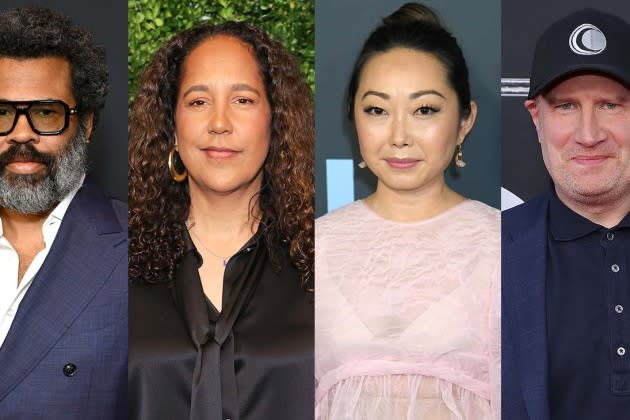Jordan Peele, Gina Prince-Bythewood, Lulu Wang and Kevin Feige Top USC Annenberg Inclusion Initiative, Adobe Foundation’s New Inclusion List
- Oops!Something went wrong.Please try again later.
- Oops!Something went wrong.Please try again later.
- Oops!Something went wrong.Please try again later.

Jordan Peele, Gina Prince-Bythewood, Lulu Wang, Kevin Feige, Will Packer, Universal and A24 are among the most inclusive directors, producers and distributors in Hollywood, according to the USC Annenberg Inclusion Initiative and Adobe Foundation’s newly unveiled The Inclusion List
The first-of-its-kind ranking system for representation and inclusion in Hollywood films based entirely on data was announced Thursday by Dr. L Stacy Smith, founder of the USC Annenberg Inclusion Initiative, to “show the world just who is doing it best when it comes to representation in theatrically released films.”
More from The Hollywood Reporter
NBCU Launch Unveils Below-the-Line Traineeship and Production Assistant Initiative (Exclusive)
Leslie Jordan and Terrence McNally Among National LGBTQ Wall of Honor 2023 Inductees
Yi Zhou, Into the Sun Entertainment Launch First -Time Director Fund (Exclusive)
“With the Inclusion List, our goal is to celebrate the films, filmmakers and companies who are supporting inclusion onscreen and behind-the-camera,” Dr. Smith said in a statement. “This is the first rigorous, quantitative assessment of hiring practices across almost 400 movies and more than 900 producers, over 350 directors and 16 distributors.”
“At Adobe, we believe that when more diverse stories are told, the world becomes a more equal and vibrant place,” Stacy Martinet, vp marketing at Adobe and an Adobe Foundation Board member, said in a separate statement. “Initiatives such as the Adobe Foundation’s collaboration with USC Annenberg gives us the ability to elevate the stories and people that are making inclusivity a priority, while also finding the ways we can still make change in the industry.”
The list features 100 of the most inclusive theatrically released movie titles from 2019 to 2022, with over 14,000 speaking characters and more than 5,500 crew members evaluated in the process of compiling the Inclusion List. The list’s corresponding website (www.inclusionlist.org) highlights the top distributors associated with those films, as well as eight individuals as the top producers and two top directors for inclusion across the time frame evaluated.
Among the list’s highest and most notable performers are Universal Pictures, A24, Gina Prince-Bythewood and Lulu Wang, who Smith says “are ushering in a new era for inclusion through the choices they have made and the stories they have told.” Will Packer, James Lopez, Kevin Feige, Dede Garner, Jeremy Kleiner, Jordan Peele, Ian Cooper and Jason Blum were named the most inclusive producers for having three or more films on the list.
“These producers have a clear commitment to championing material that reflects culturally specific content and/or a variety of perspectives and for their inclusive hiring of crew behind the scenes,” said Smith.
Seven of the top 10 films on the list were directed by women of color, and the first 47 films were made by directors from historically marginalized communities, according to Smith. The top distributors — which reflects the companies responsible for bringing the films to audiences — were ranked by the number of films appearing on the list itself and include larger companies like Universal Pictures (24 films), Sony Pictures Entertainment (14 films) and Warner Bros. Pictures (11 films), while small distributors A24 (9 films) and Neon (6 films) films took top honors.
“The Inclusion List shows us who has excelled at showcasing stories featuring voices that are often missing from popular movies,” Smith explained. “What’s even more powerful about this list — and consistent with our previous work — is that films from women and women of color directors on the list earned the highest average Metacritic score. These women are excluded from the industry when we know that they are some of the top performers, telling some of the strongest and most compelling stories. This is a list that celebrates women of color in an industry that doesn’t.”
The list is a shift from the norm of Hollywood inclusion lists, which use submissions, a nomination process or subjective decision-making, the Inclusion Initiative notes. Instead, the Inclusion List draws only from data to create its cast and crew score — which means it bases its data on actual hiring practices and story elements, resulting in a set of films, distributors and producers with a demonstrated track record for inclusion.
Best of The Hollywood Reporter
Natalie Portman at Cannes: "I Need to Leave the Drama for the Screen"
Ailing ‘Superman’ Star Valerie Perrine Finally Finds Her Hero: "The Guy Should Be Sainted"

